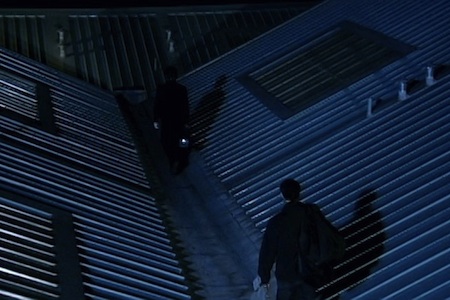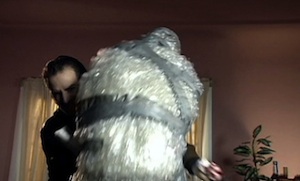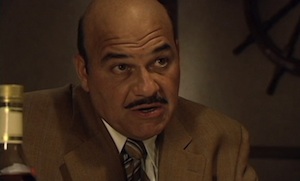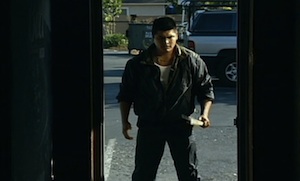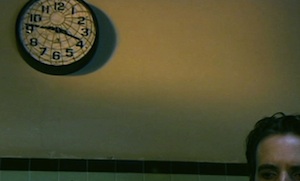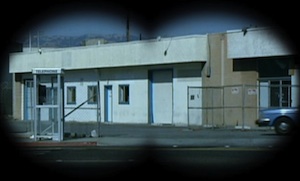A decade ago, Film Threat founder Chris Gore published a resourceful little tome entitled the “Ultimate Film Festival Survival Guide.” Hidden in its pages was a bit of a bombshell: The Cinequest Film Festival in San Jose was named one of the ten best film festivals in the world. Considered a lark at the time (particular when comparing the event to Toronto, Sundance and so forth), the organizers have always noted this “accomplishment” with a straight face. Regardless of your own particular feelings about the event, Cinequest annually presents a particularly adventurous slate, taking more chances that the better known nine generally attempt.
As you thumb through the pages of its programs, you’ll notice a significant number of films by first-timers. Where the larger festivals tend to largely champion established filmmakers, Cinequest has always sided with the so-called mavericks. To that end, in an evening to honor actor Jon Polito in 2005, the festival opted to premiere an independently produced feature rather than merely present a program of clips from his earlier films. That film, Charlie the Ox, was shot for a modest amount of money, with a sizeable cast and an unreasonable number of locations. Former RES Magazine publisher Scott Smith used his considerable experience in the film business to realize the dream of aspiring filmmakers everywhere. He marshaled his script from page to screen, premiering it at the 50th anniversary of Cinequest to a sold-out audience at the San Jose Repertory Theatre.
Like far too many independently produced films, Charlie the Ox crisscrossed the festival landscape thereafter and then, failing to receive a distribution offer that was anything other than outright thievery, it disappeared from view. When an anticipated DVD release never materialized, the film remained hidden away. Until now.
Jonathan Marlow: Tell me a little about this movie that you made…
Scott Smith: Well, we made…
Marlow: That’s right. I guess that I was involved in it.
Smith: It’s a safecracker movie. It really was born out of my frustration to get films made. I wanted to make a movie that talked about how desperate it can seem when you’re getting a little older and still dreaming of hitting that big jackpot. So when I wrote Charlie the Ox, I wrote it with this idea in mind. I wanted to create a fable about what it’s like to want something so badly and spend your whole life going after it, not getting the respect from your family and friends for that pursuit. And ultimately seeing it through and having it pay off in whatever small means that might be.
Marlow: How long did it take for you to write the script?
Smith: Well, I thought about the script for a long time. I kind of mulled it over in my mind for a six-month period and would work out little scenes in the bathroom and things like that. When I actually sat down to write it, it came very quickly. I say I wrote it in eight days. I kind of hate to say that to other filmmakers out there because it puts a lot of pressure on people to write their screenplays very quickly. It came out quickly on the page but it was incubating for an awful long time in my mind.
Marlow: Your intention all along was to take genre conventions and find a way to turn them inside out?
Smith: My intention was to create something that was smart and had thematic resonance for people but was sugarcoated in a pill that they could swallow. The best way to do that is to create a very friendly genre film. Something that everybody’s kind of comfortable with and has an easy time watching and then the messaging slips in a somewhat subversive way.
Marlow: Did winning an award at Sundance make it easier to put the financing together?
Smith: I remember winning the award at Sundance in 2002 [for the short film Carny Tales] thinking, ‘Well, this is just going to push me over the edge,’ because I was already like a lemming. I was on the top of the cliff, so I was willing to jump.
Marlow: Winning encouraged you?
Smith: They encouraged me with the award. I also knew that the Sundance thing would give me a little bit of street cred. Get me a little attention in Hollywood circles if I wanted to shop a script around and try to get known actors to attach themselves to it. It did open doors. When we gave the script to Jon Polito, I think we established some kind of credibility and…
Marlow: …and he liked the script.
Smith: …and he liked the script which made all the difference in the world! If you remember, we were in a car and he called us on the phone and, in real-time, he had read the script in about 90 minutes. He called us and said, ‘I enjoyed the writing very much. I think the part is well constructed so I’m going to call my agent and tell him to make it happen.’ Having a star pull the project through from that side helps because you can’t really push through all the agents and all the managers. You need to have the actors take an interest and want to do it from their own passion.
Marlow: Polito is an example of a perfectly cast part, given his role in the film and what he does with it.
Smith: And his reputation and his long heritage of playing very volatile, volcanic gangster guys who have a slight tinge of comedy but with this really explosive, violent temper. He’s perfect, not only in this role but also because he has this long legacy with the Coen Brothers and Miami Vice, Crime Story and Homicide: Life on the Streets, that he has this gritty side to him, this really tough exterior, but he has a great way of undercutting it with his sense of comedy.
It really was born out of my frustration to get films made. I wanted to make a movie that talked about how desperate it can seem when you’re getting a little older and still dreaming of hitting that big jackpot.
Marlow: When folks ask me how the Polito casting came about, I always say, ‘Well, we contacted Jon because Akim Tamiroff wasn’t available.’
Smith: That’s right! A specialist in playing these Transdanubian weirdos. That’s the brilliant thing about Polito. He’s got an Italian surname but he must be more on the Greek side. He has this ethnic ambiguity. He could play South American, he can play French, he can play Russian very easily. He understands where he is in the pecking order of actors. He’s a character actor, very much in the Tamiroff mold, and he’s comfortable with that.
Marlow: How difficult was it to find the lead?
Smith: I originally wrote the lead for myself. Not that I was necessarily going to play it but I think the best way to write is when you’re writing about yourself or a character, when you try to personify your own feelings about something in the character. I’m a huge guy: 6’5″ and 260 lbs. Charlie the Ox was kind of the natural extension of who I was. Kind of this oafish, out-of-shape guy, way too big to be a nimble safecracker. I actually kind of wrote it that way but, when casting it, I realized that since it was the title character and he was going to be in almost every shot, it needed to be a handsome, ‘leading man’ type of person. So we shopped it out to Christian Slater and those types of leads. We shot for the moon and fell back on some television actors. One of them, Shawn Christian, was an actor who had a great sense of comedy, a very handsome, tough exterior and had done some great work. We looked at Tremors 3, a movie that he was in. Although the movie is really sub-grade, he has a great presence in it. It’s a great showcase for his many talents. We offered the part to him and it was very difficult to negotiate the contract because there were so many levels of managers and agents who I don’t believe were working in his best interest. But when he did finally commit to the project, he cancelled on us two weeks before we were to shoot for a television pilot on the WB network…
Marlow: Which [Birds of Prey] was actually cancelled very quickly after it aired.
Smith: So nobody knows who Shawn Christian is at all. We certainly would have loved to have him but two weeks before shooting started we were completely without a star. I remember the day very vividly. You and I were a little distraught. Drinking a little too much, wondering what we were going to do because we had done a lot of pre-production work. We had all of our sets, all of our locations, all of our other actors cast, all the rehearsals, the whole production was ready. We just didn’t have a star for the movie. That night we were saying how much we enjoyed Cory McAbee and American Astronaut at Sundance and I just remember you screaming at me, ‘You’ve got to get Cory McAbee, you’ve got to call Cory McAbee!’
Marlow: My memory of this is a little different. I was insistent, sure. But screaming?
Smith: You kept saying it over and over again, ‘You’ve got to call him tomorrow, you’ve got to get this done!’ So the next day I looked over the Internet to try to find a contact for him. One of his record producers answered the phone and gave me his home number. I called him and sent him the script. He read it and in a couple of hours he called me back and told me he would love to do it. So he signed on very quickly. Cory was fantastic because not only did he really commit wholeheartedly to the project but he also had a great understanding of this character. He’d spent so many years as this kind of nocturnal nightclub performer and has spent most of his life giving up everything for his art. He connected very well with the character and just bolstered the whole production. If you remember all of the rehearsals, all of the chemistry that he had with the cast and crew. He had a great way of balancing my gruff directions with a charm and sense of humor that let everyone know that we’re still having fun making a movie.
Marlow: Cory is an entertainer in a classic sense. He kept people in good spirits when they had already put in well past what they felt they were comfortable with doing.
Smith: He’s just not a guy who’s comfortable with confrontation or with anger or anything else. He has a great way of submarining those emotions with a perfect little phrase or a light touch of humor that brings everybody back to reality.
Marlow: Cory is definitely, physically, a lot different than the role that you wrote.
Smith: He couldn’t be more different!
Marlow: He used to be a bouncer. A job where he primarily talked people out of being angry.
Smith: Can you imagine him as a bouncer? He was the absolute opposite from how I had conceived the character. I thought, ‘Maybe we can really change this and he’ll bring something completely new to it and it’ll free me up from my preconceptions of how the whole thing was supposed to be shot.’ So I thought it would work because the character created himself in the Pépé le moko or Bob le flambeur mystique and created his own nickname for himself. He thinks of himself as this ‘last of the independents’ type of character. Cory brought a completely new approach to the whole movie.
That’s the brilliant thing about Polito. He’s got an Italian surname but he must be more on the Greek side. He has this ethnic ambiguity. He could play South American, he can play French, he can play Russian very easily. He understands where he is in the pecking order of actors. He’s a character actor, very much in the Tamiroff mold, and he’s comfortable with that.
Marlow: You’ve worked with a number of the other actors, directing them on the stage. How were they to work with on film?
Smith: You know, most of them had never been in front of a camera before. I often tell the story of Michael Kane, an actor very used to being on stage. He has this great stage presence and is used to moving very freely on the stage. When he was in close-up, he had such a problem keeping his feet still that he would often just wander out of the frame. To keep him from moving, I would have to put sandbags on his feet and pin him into position. It isn’t a very professional approach but he just wasn’t used to settling in and staying on his mark. Some of the other actors were the same way. Very broad in their gestures because they have stage experience but didn’t understand that the camera can penetrate a lot of their emotions just through their eyes. In other words, they were having trouble with subtlety. The great thing is it’s really not a subtle kind of film. It really is this kind of arched fable. All of the actors have this big, expressive approach to their roles, including Cory. Certainly, Jon Polito has a way of playing things very broad. So the stage actors fit in nicely.
Marlow: Though you had the ‘World Premiere’ at Cinequest, you actually had an earlier screening at the Telluride Independent Film Festival.
Smith: It’s one of those dicey things in the festival world where we ‘showcased’ officially at Telluride so that we can save our premiere. The movie was getting a little long in the tooth! It took us nearly 18 months of post-production work to finish the whole thing and the money started to run thin. It was best that we settled into San Jose as our hometown premiere and to launch our real festival push with this.
We did really well in Telluride. Audiences were very attracted to the idea of watching a caper movie, especially with Polito in it. So they lined up around the block in the snow at Telluride and packed three successive screenings there. In San Jose, the film sold out. I think it has to do with Jon’s great and long career in these kinds of movies. But the fact that when you’re in a festival and you’re faced with a lot of foreign films or a lot of films about often very bleak and depressing themes, you feel more comfortable going into a movie where you essentially know it’s a lighthearted caper.
Marlow: One of the unconventional things about the way that it was shot is that there aren’t any establishing shots in the entire film.
Smith: I’m not really a big fan of establishing shots. You and I both agreed that we would stay away from those kinds of conventions. This makes the movie claustrophobic in a sense. I think it adds to the storybook feel to it as well. We picked locations that we knew were not going to be around much longer after our shooting. Buildings that were going to be torn down or transformed, businesses that were going under. I wanted the story to be set in city where there’s a lot of coming and going. There are a number of people that are transporting themselves from one aspect of life to the next, so there are trains and planes, cars and buses, and lots of people going here and there. Yet these characters are trapped in sets that primarily revolve around people waiting for something. A laundromat, a bus stop, a train station. Those kinds of things where people just spend an awful lot of time just waiting.
Marlow: Essentially, they’re an invisible part of the society. In a town where folks are passing through every day, these are the people who inexplicably are still there.
Smith: With a multi-ethnic cast, I think it is sometimes hard to pinpoint where it takes place. It’s nice that San Jose has a diverse set of actors but we went out of our way to cast everybody across the spectrum. I think even the architecture that we chose for some of the filming suggests that it might be Kansas City. It could be New England. It could easily be Sacramento or Seattle. It isn’t really clear exactly where it is and I like that it has kind of a timelessness in terms of its locale.
Marlow: When Jon Polito appears early in the film, he’s introduced as one thing and then it becomes clear that he’s something quite different. Cory McAbee’s character goes through a similar transition. As the film progresses, you realize that things are not as they appear.
Smith: The Polito character comes off as very confident and very efficient and very assured. As we discover, he’s a mess. He’s just a person who doesn’t have any confidence at all. These characters are kind of designed that way to be mirror images of one another to reflect inner strength of the lead character and the surface façade of the tough character that Poilito plays.
That night we were saying how much we enjoyed Cory McAbee and ‘American Astronaut’ at Sundance and I just remember you screaming at me, ‘You’ve got to get Cory McAbee!’ … I thought it would work because the character created himself in the Pépé le moko or Bob le flambeur mystique and created his own nickname for himself. He thinks of himself as this ‘last of the independents’ type of character. Cory brought a completely new approach to the whole movie.
Marlow: The same patterns follow with the characters that Joe Greenan and Joe Mazza portray as well. Charlie has a bit of a rogues’ gallery in the fact that he’s got his childhood friends to back him up. He’s later joined by a young boy and a waitress to pull off a heist.
Smith: Part of the theme is that he’s essentially stuck in this adolescent fantasy. Once again, the safecracking aspect is just a metaphor for filmmaking. I think a lot of people who see me (reaching 40 years old, still fantasizing about having a career in the film business) see that as a Peter Pan complex. A guy who just can’t quite grow up and move on.
Marlow: Yes… but you finished the film.
Smith: But the public’s perception is that that is a fool’s errand. What you’re going out and doing is spending a lot of time and effort on something that’s not going to ever reach an audience or see financial success or even critical success. So there are a lot of parallels with the character in that sense. You mentioned the rogues’ gallery. He has these older friends from high school and they used to talk about living a life of crime. Those guys all grew up and had families and went on to have careers and gave up that foolish notion. He’s stuck in this time. The only people that he can rely on to help him with his plan are a young kid and a teenaged girl who are essentially the best that he can come up with. They understand his dreams better than people his own age.
Marlow: Charlie is obviously a large project given the budget that you were working with.
Smith: To think about it now, we were foolish to try to do what we did. Coming off the win at Sundance, I really thought it was important to get into Sundance the following year so that I could have some kind of alumni status. That notion was completely foolish. That’s just not the way it happens anymore. The independent film world changes so fast. Their priorities change. In the wake of what’s going on internationally, there’s a lot more focus now in the festival circuits of giving (for example) Iraqi filmmakers a profile in the festival, which reduces the amount of frivolous safecracker movies that they’re willing to screen. [Editor’s note: This interview took place in 2005.] The other thing we did was move into production very quickly. I think it’s the only way we could’ve done it because we didn’t have six months to plan the movie out. We had to do it in 90 days. We had to shoot very quickly as well and we had to use whatever resources were available to us. I think one of the clever things we did was to create a story around the local buildings and character actors, things we had in San Jose, and just use that as our strength in our script instead of trying to shoot for the moon and hope that we would get some sort of grant financing to do everything. We made a lot of mistakes. Had we been in a big Hollywood production, they would have shut us down. We spent a lot more money than we originally set out to spend. We were plagued with all the problems that a normal independent film was plagued with. We had power shut downs, paychecks bouncing, people storming off the set. One of the actors passed away soon after shooting, which prevented us from looping in some dialogue later.
Marlow: Dialogue, in Wellesian fashion, that was ultimately dubbed by you. I doubt anyone ever notices.
Smith: One day we showed up at this hangar where we were going to shoot. The truck we needed to park inside the hangar was too tall to get through the doorway at the entrance so we had to let all the air out of the tires and put all of the heavy equipment and all of the actors in the back of the truck to weight it down enough to clear the top of that door. It’s that kind of synchronicity and luck that we had in shooting. The fact that we got it done… Some filmmakers never get the chance to actually finish their principal photography let alone finish the post-production on a movie.
Marlow: Initially you were thinking of shooting in mini-DV with equipment that you owned. Whether right or wrong, my thinking at the time was somewhat more practical. If you’re going to spend a significant amount of money to make this film, why not spend a little bit more and shoot on a format that would give you a little more flexibility, ultimately ending up with a better image to work with?
Smith: If you remember, in those early days, I was flirting with other cinematographers and they were not like-minded. I think you were up to the same villainy that I was up to. That was the first decision. Who’s going to shoot it? Once I decided that you and I would work best together, the next thing is the format. We could have shot it in DV but I think both of us were thinking, ‘Let’s spend the extra money to get a higher resolution format to correct some of the problems that we would have technically with shooting in a low resolution format.’ Then if we wanted to bump it down at least, garbage in, garbage out. It all comes down to production value. The one thing I love about the movie, currently, is that no one ever brings up resolution or format or anything. The questions never arise because the film looks like a 35mm film. I know that you’re picky enough to look at the image with some scrutiny but most of the people, once the story gets under way, never consider the issue of image quality at all.
We made a lot of mistakes. Had we been in a big Hollywood production, they would have shut us down. We spent a lot more money than we originally set out to spend. We were plagued with all the problems that a normal independent film was plagued with. We had power shut downs, paychecks bouncing, people storming off the set. One of the actors passed away soon after shooting, which prevented us from looping in some dialogue later.
Marlow: I wager they would’ve if we had gone the mini-DV route. I think the material benefits from the look of film, even though it was shot in HD. That was an early consideration, obviously. Most audiences find it difficult to tell the difference. Granted, my own inclination was to shoot on film but your RES affiliation more-or-less dictated that it had to be shot on video.
Smith: The film has this fable overtone to the entire production. Because we were shooting without a full-time art director or costume designer, we were at the mercy of the way the real world looked through that camera. The colors were kind of bright and distinct and the camerawork did a great job of achieving that. We were fortunate with the nature of a multi-ethnic cast and to locations that were very vivid and almost surreal. The restaurants that we used had a consistent marine motif while the graffiti backgrounds that David Choe created gave the movie a very unusual quality.
Marlow: It definitely (and intentionally) looks a bit different than other independent films out there.
Smith: It doesn’t look like a HD movie at all! It almost looks like a saturated 35mm print.
Marlow: I think that we knew what we were up against and we had to convince other people to go along with that. Some members of the cast and crew weren’t up to that challenge and others just went with it. Sometimes on the set, your efforts are to just convince people to keep trying, keep going with it, because it was an ambitious shoot by any standard.
Smith: There were just a few of us who were up for the battle fatigue. Only a handful, maybe. I certainly knew what I was willing to endure to get it done and our producers were very supportive as well. Most of the cast and crew weren’t as heavily invested. Some people were very frivolous in their attitude toward shooting an independent film. Some actors, like Polito, showed up completely prepared with all their lines memorized, very professional in their approach. I think we were fully alert to the responsibility as ‘do it yourself’ filmmakers to not take anything for granted, not to ask too much permission from local film commissions and police or anything like that. We just stole what we needed to get it done. It’s very hard when you’re telling your friends and family that you’re making an independent film for them not to have illusions of grandeur. They think that you must have some big stock-pile of cash and that you can pay them to sit around and do very little, when really you don’t have very many resources to even complete your project.
Marlow: There was definitely an attitude among most of the crew that weren’t already connected to the project before we started shooting and had some investment in your efforts. Our sound guy, Scott Kinzey, was priceless. He was adaptable to any situation.
Smith: Kinzey’s not only a professional, he’s also a gentleman. He’s also the kind of sound man who works on mostly corporate projects the whole year and says to himself, ‘I’ll allow myself to work on one independent project a year or every two years because I have a family and I can’t do it enough to where it makes my family suffer but I’ll do it occasionally because I enjoy working on independent films.’ He also read the script, which is a huge difference. The rest of the crew didn’t really read the script or get it or appreciate it. I think Kinzey understood what the movie was about and thought that maybe the film had its chance to tell an interesting story and was committed to it on that level. Still, he’s there to do a job for money. Other people were on the project as volunteers or production assistants that weren’t getting any kind of significant pay. They didn’t have any faith in the project because this was one of their first films or this was a small independent project that they’d cut their teeth on and move on to something bigger.
Marlow: What was your experience with Charlie during the resulting festival tour? After many months of editing the film and seeing it change shape throughout that process, watching it with an audience was something else altogether.
Smith: I’m completely happy with the movie. I think audiences really enjoy it (which is really the saving grace of the whole thing). Festival programmers don’t always get it. They used to tell me that they thought the production values were great, the acting was great, the story was fun and they really enjoyed it but they don’t have room for it in their schedule. I think audiences are different. They have room in their viewing schedule to watch a movie like this. When they watch it, they typically enjoy it and recommend it to somebody else. It’s the kind of film that I think will have its life down the road and I’m very pleased.
Marlow: You knew that all along, right? Your expectation was that this is a film that some unsuspecting person will come across…
Smith: It’s too clever for its own good, this movie. What we were trying to do is skirt this message under the radar in a genre film. This movie that heralded back to The Asphalt Jungle or Charley Varrick. In their own way, smart movies that are all very subversive and tucked away in the back of this little genre. I think that’s what we did in such a subtle way. I don’t think we really beat anybody over the head about the way in which we were doing it and, because it comes off so subtly, I think it’s lost on even festival programmers who might fancy themselves very intelligent. My father, when he originally watched the movie, didn’t appreciate it and I was kind of hurt by that. I not only thought my father was an intelligent man but also a really smart moviegoer. He tended to gravitate towards movies that were very clever but kind of base in their aesthetic. Then he wrote me an email saying, ‘The more I watch it, the more I enjoy it.’ I think a lot of people say that about this movie because they start to see recurring themes that are rewarding for them on second viewing.
Marlow: It’s definitely a script that does not take the intelligence of the viewer for granted. It pulls them along in a particular direction but it requires time to think.
Smith: We almost took for granted their knowledge of the genre. We expected that people would understand heist movies and their conventions. If it falls short anywhere, I think it’s because we were playing with the conventions of the genre and the audience may not understand that we’re playing with them.
Ma

